Habitat destruction is a massive threat to the future of the Critically Endangered orangutan. They are often brutally slaughtered as their rainforest home is destroyed. Orangutan infants become orphans and often then become victims of the insidious illegal pet trade.
Natalee was born in approximately 2016. She and another young orangutan named Ung Aing were smuggled illegally into Thailand as babies. They both most likely saw the horrific killing of their mothers and have been through terrible trauma. In December 2020, the Jambi agency for the Conservation of Natural Resources arranged for their repatriation back to Indonesia from a wildlife rescue centre in Thailand. Thankfully, Natalee was in a healthy condition and she and Ung Aing are very closely bonded.
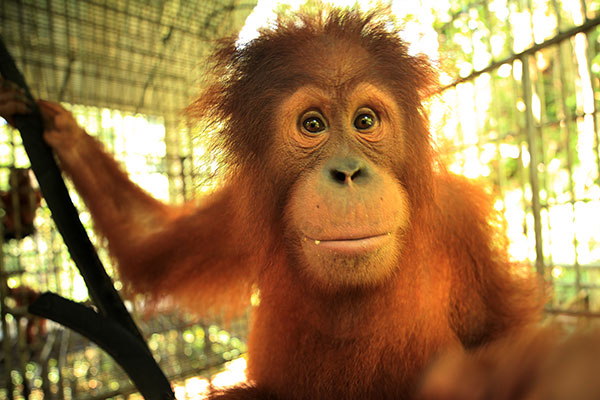
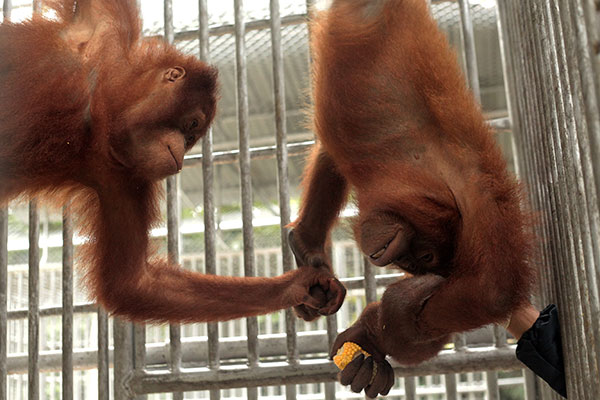
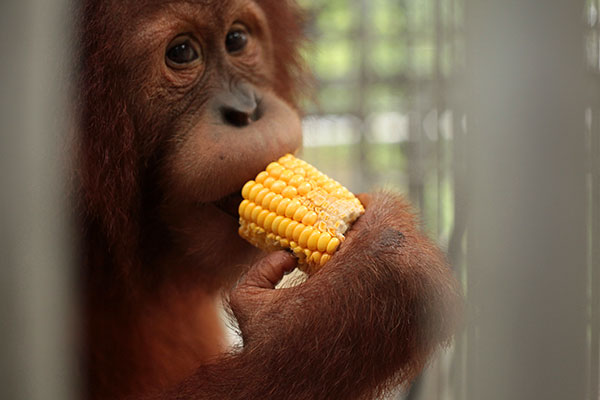
After undergoing quarantine and a full medical check, these two youngsters made the journey to join the reintroduction program in the Bukit Tigapuluh Ecosystem in Sumatra. Natalee is learning how to use all the different enrichment items including puzzle boxes and feeder balls to obtain food. Enrichment is vital to keep orangutans both mentally and physically active, and the skills they develop while using these items can be transferred to the wild. The orangutan keepers also bring the young orangutans a wide variety of different forest fruits, leaves and termites so the orangutans can become used to these foods and will be able to recognise them.
Thanks to people like you, Natalee has commenced Jungle School with other young orangutans. She prefers to stay close to her close friend Ung Aing during her jungle outings. Natalee doesn't like to be carried to Jungle School so she will use the ropes to climb from her enclosure into the forest canopy. Natalee is eager to explore the forest and has tried many forest foods including fruits, leaves, cambium, and stem. She also enjoys all the food and soy milk given to her by the keepers. Natalee doesn’t know how to build a nest yet, but she can learn this skill from other more advanced orangutans at the sanctuary.
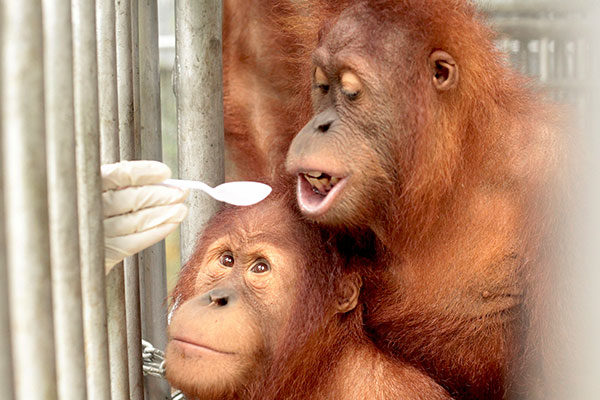
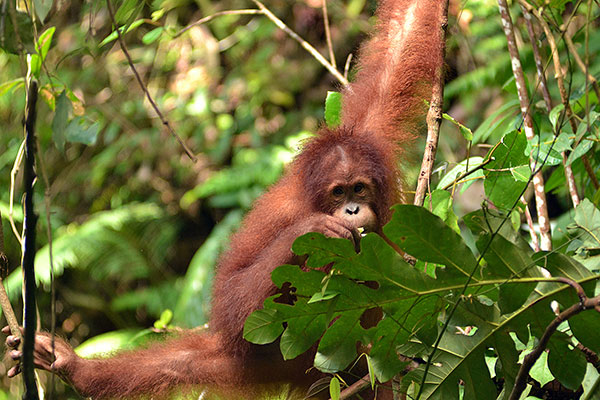
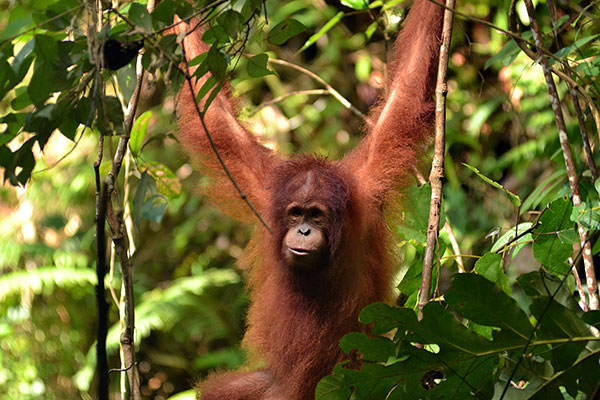
The staff at the orangutan reintroduction program in the Bukit Tigapuluh Ecosystem in Sumatra are dedicated to the care and welfare of Natalee and the other orphans. These young orangutans receive love, care, and nutritious food and milk from their carers. But just like humans, infant orangutans need to be taught the skills they need to survive, and a wild orangutan will usually spend more than eight years with their mother to learn all the vital skills they need to thrive in the wild.
Every orphaned orangutan needs at least five years of rehabilitation and jungle schooling, which is why we so desperately need more people like you to join our adoption program and support orphaned orangutans like Natalee through this long but desperately needed process.
Thanks to people like you, Natalee will hopefully one day be wild and free in protected habitat. Please join the team to help her get there!
More about our Rescue, Release and Rehabilitation programmes
SRA, the Sumatran Rescue Alliance, is an alliance between The Orangutan Project, Centre for Orangutan Protection and Orangutan Information Centre.
Despite its highest protection status in Indonesia, orangutans are not well protected from crime. Forest clearing to make way for oil palm plantations, mining, agriculture, logging concessions and population expansion has created the greatest threat to the survival of the orangutan. Habitat destruction has decimated orangutan populations over the last decade. The Orangutan Project funds numerous orangutan rescue teams in Sumatra and Borneo that are highly trained and skilled at relocating wild orangutans in high-risk situations into protected forest habitat.
Land clearing creates a myriad of other threats including poaching, illegal possession and the black-market trade. These rescue teams also undertake confiscations of illegally held ‘pet’ orangutans. Sadly, many infant orangutans are kept and sold illegally as pets in Indonesia. This occurs when the mother has been killed – usually because they are considered an ‘agricultural pest’ if they enter oil palm plantations to find food, since so much of their natural habitat and food sources have been destroyed. Infant orangutans are highly traumatised after witnessing the brutal killing of their mothers who they would have been highly dependent on for many years. They are then often kept in deplorable conditions as someone’s pet and fed inappropriate food.
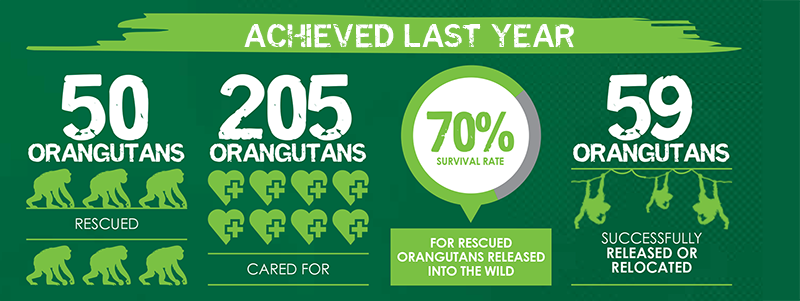
Once these young orangutans are confiscated by rescue teams, they are taken to the appropriate care centre depending on which area they originated from. Here they undergo a full medical check and are treated for any illnesses and parasites. New arrivals undergo a quarantine period before being introduced to other compatible orangutans. It is imperative that orangutans at these care centres are provided with enrichment to keep them mentally and physically stimulated. Orangutans are highly intelligent and spend most of their day in the forest traveling and searching for food. If orangutans are confined and bored this can result in stereotypic and negative behaviours including pacing, hair plucking, rocking and regurgitation of food.
One of the biggest problems faced when reintroducing orangutans to the wild that have spent considerable time in captivity is their inability to be able to recognise available food sources, especially during seasonal variations. Wild orangutans eat hundreds of different plant species and they change their diet according to the season and food availability to survive. Orangutans predominantly feed on high calorie fruits during the fruiting season but must rely on eating other food sources such as leaves, termites and cambium when fruit is scarce.
Young orangutans at the care centres and training release sites are taken out for ‘forest school’ outings where they can develop the skills that they need to survive in the wild including nest building, travelling in the forest canopy and identifying natural food sources. They would normally take years to learn these skills from their mother in the forest, so the rehabilitation journey is a slow process. Orangutans develop at different rates depending on their age, temperament and how long they spent with their mother in the forest.
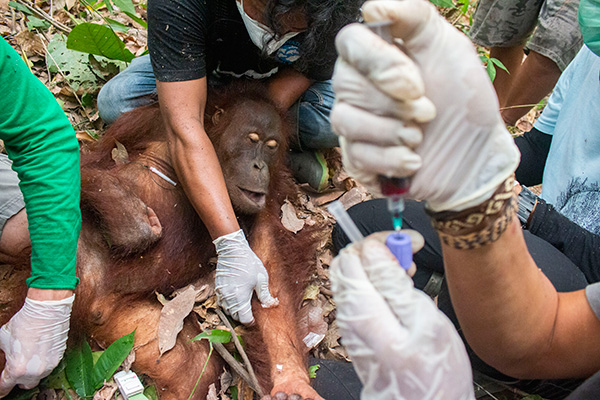
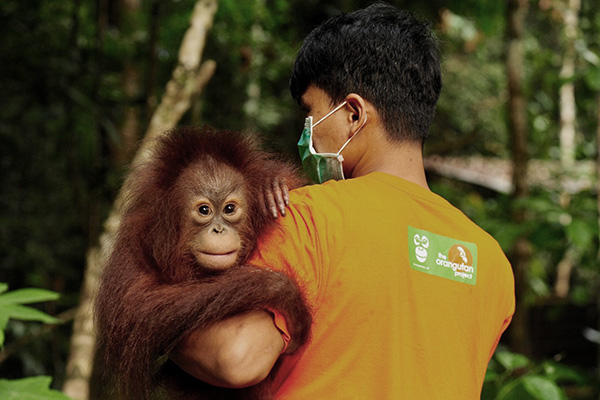
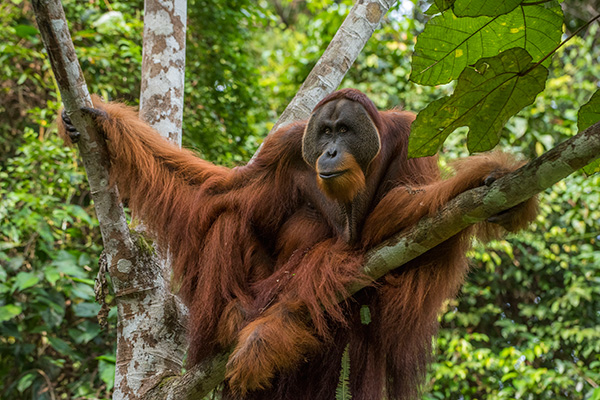
Orangutans are observed closely during forest school by orangutan trainers and their activity patterns of travelling, foraging and resting are closely monitored and recorded. Orangutan trainers also closely observe and record what foods the orangutans are eating. It is very important that orangutans learn to mostly eat fruit during the fruiting season to increase their calorie intake and fat reserves to help them survive during the dry season. Orangutans must also be able to recognise and eat a wide range of other forest foods including flowers, termites, bark and cambium. Young orangutans need to learn how to make a strong and stable nest in the canopy. This can often take a long time to learn since it is quite a complex procedure. Often young orangutans watch and learn how to build nests from other more experienced orangutans at forest school. It is also vital that young orangutans do not come to the ground, especially in Sumatra, since the Sumatran tiger is a natural predator.
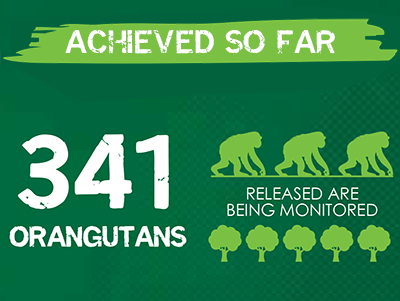
Even after release, orangutans are closely monitored to ensure they are adapting to full-time jungle life. Orangutans at some release sites have a small transponder inserted between their shoulder blades so they can be tracked using telemetry equipment well after their release to check on their progress. This has been a huge development in allowing longer term monitoring and assessment of released orangutans. It also allows the orangutans trainers to reduce the monitoring of the orangutan over time as they adapt to their environment. The Orangutan Project supports the post-release monitoring of orangutans at numerous sites in both Borneo and Sumatra with a particular focus on the newly established Sumatran orangutan population in the Bukit Tigapuluh ecosystem in Sumatra.